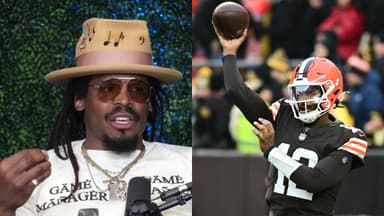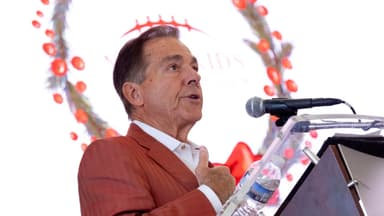In recent memory, few NFL stories have screamed strength, heartbreak, and resilience quite like Greg Brooks Jr.’s. It’s a tale so moving that from Ryan Clark to Cam Newton, many veteran football stars were brought to tears.
Advertisement
A former LSU safety with clear NFL potential, Brooks’ life changed forever after he began experiencing dizziness and illness during practice sessions. It eventually revealed a rare brain tumor. But the worst part? The LSU captain’s condition had been misdiagnosed. Brooks Jr.’s team doctors thought it was vertigo.
The star CB has since filed a lawsuit against LSU, alleging that team doctors failed to act on early symptoms, ignoring critical warning signs that now leave him paralyzed and struggling to speak. Sadly put, the delay in care didn’t just derail a promising football career — it cost him his health, his mobility, and the life he had built.
Brooks Jr. further gave the world an insight into his horrid experience in a recent emotional interview with Ryan Clark — a conversation that left even the veteran analyst in tears.
“My tears are like part pride but also just anger,” Clark said after speaking to the former LSU star, who could barely get his words out. “That baby didn’t deserve that,” noted an emotional Clark.
Heartbreaking: Former LSU star defensive back Greg Brooks Jr. just wants everything in his life to be back to normal.
“I just wish i could be normal again”
Brooks is recovering paralysis and speech impairment after brain tumor — ending his #NFL dream pic.twitter.com/dCzVtaHRsD
— MLFootball (@_MLFootball) May 4, 2025
A few days after Clark’s emotional outburst, Newton, watching from afar, has now weighed in on this matter. In the latest episode of his podcast, 4th&1, the former NFL MVP drew a direct line from Brooks’ experience to a similar ordeal faced by Pro Bowl offensive tackle Trent Williams.
A few years ago, Williams accused Washington’s medical staff of downplaying what turned out to be a cancerous growth. He later decided to stand his ground and refused to play for the Commanders again.
“Big Trent stood firm on not wanting to play for Washington because he felt he was misdiagnosed,” Newton recalled before urging the medical community to escalate responsibility in these matters. “Doctors, just like us, all have to be held accountable.”
Newton wasn’t making a blanket indictment of the medical profession. He acknowledged that errors can happen, even with the best intentions. But the stakes, especially in football, are too high to ignore. As Newton put it, “A misdiagnosis of a car leads to that car ending up in a junkyard. A misdiagnosis from a doctor leads to a human in the graveyard.”
For the former Panther, the point he was trying to make wasn’t restricted to the medical sphere. It was personal, too. And he did so by challenging teams and institutions to show real care, not just when players are winning games, but when things go sideways.
“This is not a laughing matter,” he said. “Somebody has to be held accountable. Misdiagnoses happen every day, but this man gave you his life.”
What bothered Cam Newton the most was the lack of visible support and empathy from LSU’s program for Greg Brooks Jr. “Sometimes all people want is for you to seem like you care,” he said. “The smallest initiative would have gone a long way.”
That said, Greg Brooks Jr. himself continues to push forward, quietly and courageously. In his own words, he just aims “to be normal again.”
But kudos to Cam Newton for speaking up. His message wasn’t just grief or outrage — it was a call to change. Because in a sport that often talks about family and loyalty, those values need to extend beyond game day. For when the final whistle blows, what matters most is whether players were truly cared for.
So even though Greg Brooks Jr. may never return to the field, his story may still shape the game by demanding better care, louder accountability, and a deeper sense of responsibility for the young men who put everything on the line.







